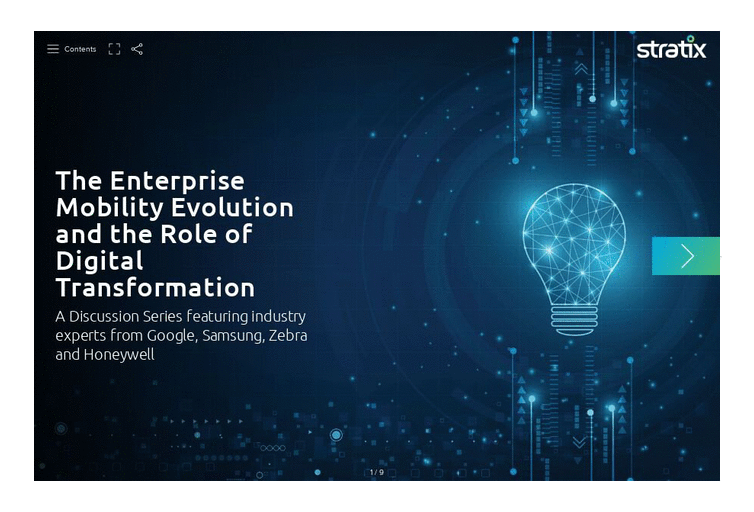Exploring “Real Life” Impacts of Mobile Technologies
Written by Sandra Tansky
4 Min Read
Blog
Conversations About Digital Transformation: Samsung
Smart, effective enterprise mobility is comprised of many touchpoints involving providers of industry-leading devices, apps, services and more. Each has a unique and valuable perspective on the most important aspects to achieving success through enterprise mobile technology deployments. Recently, we conducted a series of in-depth discussions with some of the biggest names in enterprise mobile technology to better understand the seismic shifts that are bringing about this digital transformation.
In our latest installment, we engage Mike Coleman, Vice President, Mobile Channels, Samsung Electronics America. Samsung has emerged as an innovative mobility leader – both in the enterprise and consumer spaces via enterprise-grade features like their Knox security platform and consumer-centric hardware such as their Galaxy series of smartphones, tablets and wearables. Their rise to prominence is directly tied to how Samsung sees the seismic shifts in computing both now occurring and just ahead. On that point, Coleman notes “A survey Samsung conducted with GfK found mobile workers spend one-third of their day working on their smartphone and can get half of their work done using only their phone. We are now seeing the transformation right before our eyes.”
“We are moving from mobile-first to mobile-only” he continues. “In that same GfK survey, we found 62 percent of workers are willing to give up their PC entirely, provided they could connect their smartphones to a monitor, keyboard and mouse. We have achieved this with Samsung DeX, which uses a Galaxy smartphone to power a desktop experience. Today’s Galaxy smartphones are more powerful than some laptops and grants users the freedom and flexibility they need. This mobile format is critical to the business transformation.
We’ve focused on making this transition easy by building out an ecosystem of leading business software providers who can help our customers quickly deploy new mobile apps to meet their unique demands. There are now so many use cases for mobile that workers need to be able to utilize information in a way that is comfortable, efficient and quantifiable in terms of value. The end goal for every organization is to improve productivity and profitability. Mobile is the vehicle that is allowing users access to these types of data and solutions.”
One industry vertical that is ground zero for this fast and furious shift is the trucking industry. The Electronic Logging Device (ELD) Mandate enacted by the United States Congress required trucking companies – typically a very manual, paper-based industry – to enabled ELD devices in their vehicles to record a driver’s Record of Duty Status (RODS), replacing the paper logbook they previously used to document their activity.
Samsung and Stratix have partnered together to provide a comprehensive, well-supported solution for trucking companies to get in compliance with ELD regulations.
“In working with Stratix,” notes Coleman, “we were able to deliver integrated mobile solutions to a leading LTL carrier. They needed to migrate from thousands of legacy Windows-based rugged mobile devices to a modern ELD solution with full life cycle management and enterprise-grade security. With Stratix, we helped to enable digital transformation for their fleet via the adoption of Galaxy Tab Active2 tablets for their drivers. This gave them real-time access to routes, truckload contents and other detailed information on a daily basis.”
The key to successful deployments like these isn’t necessarily or motivated how willing an industry is to utilize mobile technology to create digital transformation, but rather how optimized the user experience is for the employees who must buy in to these changes. On that point, Coleman says “If technology is not intuitive, it’s not going to be adopted at a high rate across an enterprise. We strive to build solutions that are scalable, yet easy to use for frontline employees.
For many organizations, taking a BYOD approach to mobility has been the biggest barrier to adoption. Many businesses viewed smartphones as personal/consumer devices but are now realizing they’re core business tools that power productivity. End users want the flexibility to use their own devices, but a BYOD solution makes taking full advantage of mobility more challenging. Device management and security becomes more complex as you are dealing with various operating systems and models. Deploying innovative new applications also becomes more cumbersome due to compatibility issues. Yet, enterprises must still deliver a seamless user experience, while ensuring that all company data is secure.”
This is where Samsung’s Knox security suite comes in. Like their Galaxy hardware range, Knox is flexible enough for both personal and enterprise-specific purposes. For enterprise scenarios, Samsung is laser-focused on making Knox simple to implement and maintain so that device security remains intact.
Coleman explains that Samsung “understand[s] launching mobile initiatives can be complex for businesses. [Thus], we’ve created tools to make the entire process easier, whether at the individual level or BYOD. Device management and security begins with Samsung Knox. This is a multi-layered defense-grade security platform from the hardware up and designed for the enterprise. The Knox platform is recognized as highly secure and trusted by the Department of Defense as well as governments around the world.”
Continuing, he says “Knox allows an entire fleet of devices to be configured and customized remotely, while making device enrollment easier for both IT admins and specific users. The platform offers affordable device management to keep data protected across multiple operating systems. With Knox, we want companies to feel empowered to manage the user experience in a secure and scalable fashion. In working closely with the Stratix team, we’ve come up with very trusted and proven solutions that can do just that.”
This close relationship is why both companies are uniquely-positioned to adapt to the changes in the digital landscape and to prepare companies for their own digital transformation.
“Through our strategic partnership,” Coleman notes, “Stratix uniquely offers one of the most well-integrated and supported deployments of Samsung devices and services for the enterprise. From the Samsung Knox security platform to Samsung’s industry-leading portfolio of smartphones, tablets and wearables, they provide premium field services, deployment and Day-2 support of the entire Samsung ecosystem. This has been the fastest growing segment within our mobile B2B business here in the US. And that’s because partners like Stratix take the technology we offer, collaborate with us and then build solutions that allows our customers to differentiate themselves in the marketplace. [Customers have] shifted their thinking from procuring devices from the carriers to procuring devices from the channel partners when there’s a true solution that needs to be wrapped around it. And that’s where we see our partnerships essentially thriving.”
Be sure to read the rest of our conversations about digital transformation in our eBook The Role of Enterprise Mobility in Digital Transformation for valuable insights on how the evolution of enterprise mobility is changing the business landscape.

The Role of Enterprise Mobility in Digital Transformation
We interviewed industry experts to get their most valuable insights including real world examples of successful, mobile-led transformations.
Read the eBook












